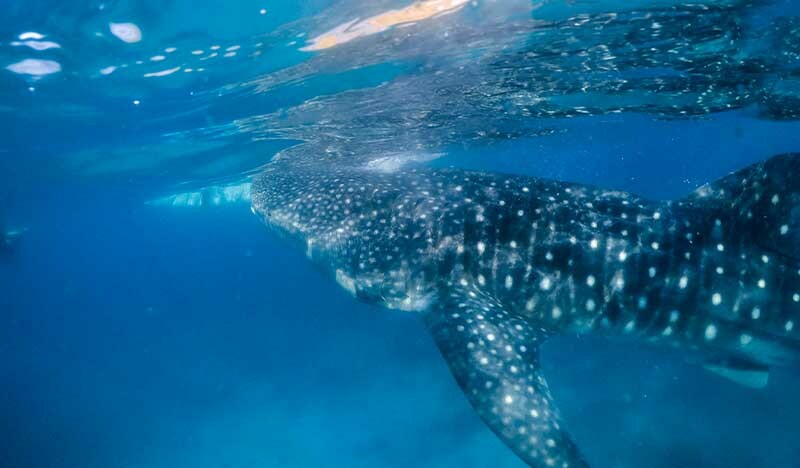Gov’t Unveils Policy for Whale Shark Protection

The government has introduced a new policy to enhance the protection of whale sharks and their environment.
This policy, which revises the existing Code of Conduct for the Protection and Conservation of Whale Sharks from 2009, was announced by the Ministry of Climate Change, Environment, and Energy during a ceremony in Alifu Dhaalu atoll Dhigurah, coinciding with International Whale Shark Day.
The updated policy will come into effect in three months and includes significant changes aimed at minimising human impact on whale sharks, in line with the Environment Protection and Preservation Act. Key regulations include:
- Maintaining a minimum distance of three metres from whale sharks and four metres from their tails.
- Prohibiting contact, injury, or holding onto the whale shark’s fin while swimming.
- Avoiding any obstruction to the whale shark’s movement.
- Staying at least 20 metres away when snorkelling above a whale shark.
- Banning feeding and the use of lights or flash photography.
- Restricting vessels from approaching areas where whale sharks are present.
- Enforcing a minimum altitude of 30 metres for drone photography.
- Prohibiting the use of selfie sticks near whale sharks.
The policy also establishes a 250-metre contact zone around whale sharks, allowing a maximum of three vessels at a time. Vessels must not exceed speeds of five knots within the contact zone and should reduce speed to two knots within 50 metres of the animal. Exceptions are made in emergencies, where vessels may leave the area at higher speeds.
Additionally, water sports vehicles are banned from the contact zone, and vessels must maintain a 15-metre distance from the nearest whale shark. The policy aims to address concerns over overcrowding at popular whale shark sighting locations, particularly in protected areas like Hanifaru Bay in Baa atoll and the waters near Maamigili in Alifu Dhaalu atoll. Recent years have seen a significant decline in whale shark sightings, largely attributed to insufficient monitoring.
The policy also outlines protocols for dealing with sick or injured whale sharks. Immediate notification of the Environment Protection Agency (EPA) is required if a whale shark is found trapped in a net, mooring line, or flotsam.
Measures must be taken to safely free the whale shark without causing harm, and any flotsam must be brought ashore rather than returned to the sea. Injured whale sharks are to be left to heal naturally in their habitat.
Further guidelines in the policy provide best practices for activities in whale shark habitats and address procedures for handling dead or injured whale sharks. Violations of the new policy will result in fines under the Protected Species Act.
Whale sharks have been classified as an endangered species on the International Union for Conservation of Nature’s (IUCN) Red List since July 2016.






